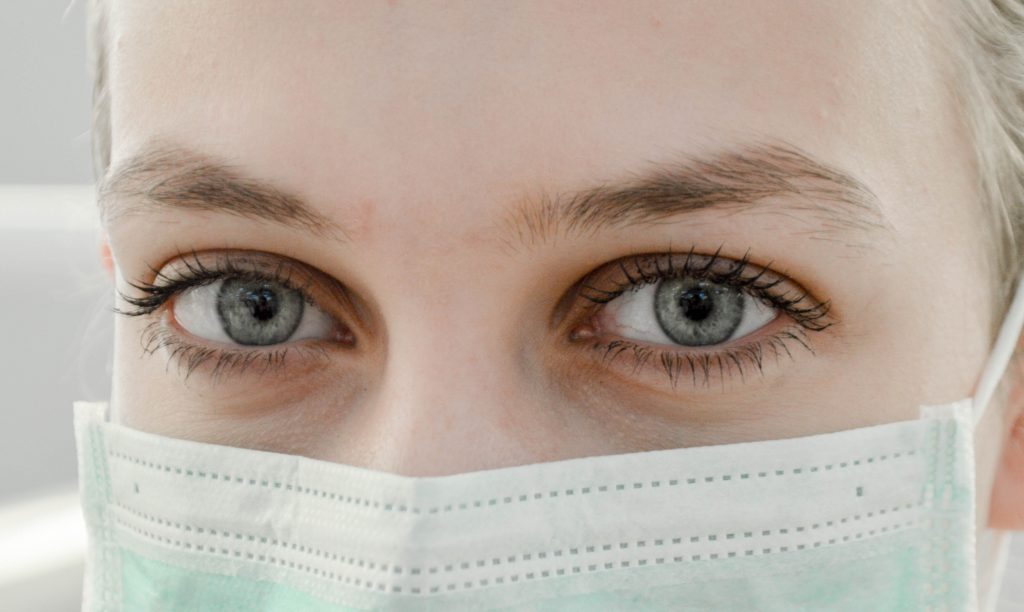
BLC continues to follow the guidelines from the Governor’s office to ensure the safety and health of our residents. We appreciate the patience of our families and residents these last few months. BLC has thought outside the box (literally – with an outdoor visiting booth) with different ways of getting our residents and families together, yet safely.
Can face masks help slow the spread of COVID-19? Yes! Face masks combined with other preventive measures, such as frequent hand-washing and social distancing, help slow the spread of the virus.
Why weren’t they recommended at the start of the pandemic? At that time, experts didn’t know the extent to which people with COVID-19 could spread the virus before symptoms appeared.
The World Health Organization and the US Centers for Disease Control and Prevention (CDC) include face masks in their recommendations for slowing the spread of the virus. The CDC recommends cloth masks for the general public, not the surgical and N95 needed by health care providers.
Wearing a mask correctly is the key to making it effective to prevent the spread of the virus. Masks should cover both your nose and mouth.
Medical/Surgical Masks (disposable)
 A medical and/or surgical mask is a loose-fitting disposable mask that protects the wearer’s nose and mouth from contact with droplets, splashes and sprays that may contain germs. A surgical mask also filters out large particles in the air. Surgical masks may protect others by reducing exposure to the saliva and respiratory secretions of the mask wearer.
A medical and/or surgical mask is a loose-fitting disposable mask that protects the wearer’s nose and mouth from contact with droplets, splashes and sprays that may contain germs. A surgical mask also filters out large particles in the air. Surgical masks may protect others by reducing exposure to the saliva and respiratory secretions of the mask wearer.
Cloth Masks (Washable & Reusable)
 Cloth masks are effective. They are intended to trap droplets that are released when the wearer talks, coughs or sneezes. Cloth masks help reduce the spread of the virus by people who have the virus but don’t realize it.
Cloth masks are effective. They are intended to trap droplets that are released when the wearer talks, coughs or sneezes. Cloth masks help reduce the spread of the virus by people who have the virus but don’t realize it.
Can I get sick from exhaling the carbon dioxide that gets trapped under the cloth mask? No. Properly fitted masks offer adequate airflow while still covering your nose and mouth. This makes the accumulation of carbon dioxide impossible.
Masks can be made from common materials, such as sheets made of tightly woven cotton. Instructions are easy to find online. Cloth masks should include multiple layers of fabric.
N95 Masks (disposable)
 N95 masks offers more protection than a surgical mask because it can filter out both large and small particles when the wearer inhales. It is designed to block 95% of very small particles. Some N95 masks have valves that make them easier to breathe through. With this type of mask, unfiltered air is released when the wearer exhales.
N95 masks offers more protection than a surgical mask because it can filter out both large and small particles when the wearer inhales. It is designed to block 95% of very small particles. Some N95 masks have valves that make them easier to breathe through. With this type of mask, unfiltered air is released when the wearer exhales.
Like surgical masks, N95 masks are intended to be disposable. However, researchers are testing ways to disinfect N95 masks so they can be reused.
While surgical and N95 masks should be reserved for health care providers, cloth face coverings are easy to find or make, and can be washed and reused.
People with breathing problems, children under age 2, and those who can’t remove the mask without assistance should not wear one.
Storing a Facemask
Facemasks should be carefully folded so the outer surface is held inward and against itself to reduce contact with the outer surface during storage. The folded mask can be stored between uses in a clean sealable paper bag or breathable container.
According to the CDC, studies suggest that many people who have the virus are asymptomatic, meaning they show no symptoms. You may have the disease and unknowingly spread it to others, including those with underlying conditions that are more vulnerable to severe illness. Asymptomatic carriers can increase the disease’s spread if they aren’t taking proper precautions, including wearing a mask, washing their hands frequently and social distancing.
At this time, being outside is generally considered safer than being inside. When taking a stroll or participating in other outdoor activities by yourself or with people you live with, a mask isn’t required.
However, when you find it difficult to maintain at least six feet of distance from people you don’t live with – such as passing someone on a sidewalk or eating out at a restaurant – it’s important to have your mask on. You should always have your mask on hand when you leave your home.
Wearing a mask is highly effective and can make your daily life safer for those around you, but it’s not a permission slip to “return to normal.”
Reference: University of Maryland Medical System & Mayo Clinic

